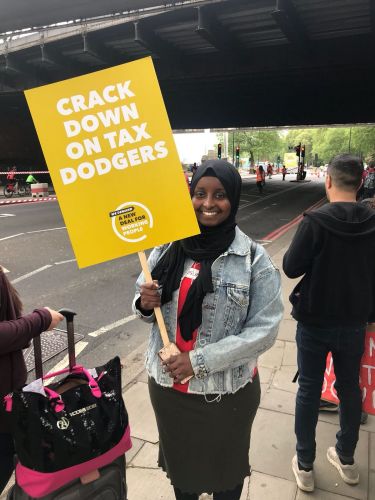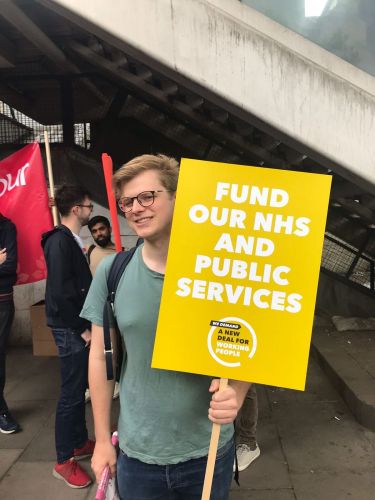Helping young workers understand unions and win at work

Standing together in unions has helped workers win fair treatment and challenge discrimination. It’s also helped us win changes that have made life better for all workers, from bank holidays to the minimum wage.
But if we’re going to remain a force for the future, we’re going to have to change to recruit a new generation of union members. Nearly 90% of under 30s on low to median incomes work in the private sector — but just 6.3% of them are in trade unions.
Our values are as relevant to these workers as they’ve ever been. There’s no doubt young workers need unions, but we need to understand why they aren’t joining and do more to make our unions make sense to them.
What have we found out?
If anything we do is going to have a chance of working, we need to make sure it genuinely matches with what young workers need from us. We spent a year researching the situation directly with hundreds of young workers. We asked them how they feel about their work, the kinds of issues they have. We also looked into what they’re currently doing about things that frustrate them, or where they feel they don’t have any options.
It showed us that work really isn’t working for too many younger people in the UK. Young workers are more likely to be employed in industries that have seen huge increases in casualised work over the last decade. Retail, hospitality and social care employ large numbers of young workers.
Zero hours, temporary contracts, agency work, all mean it’s getting harder and harder to balance your working life with your personal life. That’s doubly the case for young parents, trying to balance unpredictable shifts with costly and inflexible childcare. Low pay makes it hard to get by and plan for the future.
Shift pattern is hard – one day early shift, one day late. That makes it hard to see family and do things out of work.
The research revealed some uncomfortable learning about why young workers aren’t joining collective action at work, despite the problems they face. We found catastrophically low expectations that work can be any better, a sense of futility towards taking action at work, and a worrying lack of trust between young workers and the colleagues that they’ll need to have their back if they can be persuaded to try. All big barriers we need to overcome.
We know young workers can move mountains when they unite in unions - just look at the great work done by London’s Ritzy cinema workers or the McDonald’s McStrikers. But we want to make this the norm rather than the exception. We’ll need to reach out to many thousands of them, and take them on a journey to realise that their problems aren’t insurmountable, and that they do have power when they act together.
Building an idea
Once we had a better understanding of what young workers are feeling, it became a lot easier to devise ideas that might make sense to them. We ran workshops to generate ideas, working with young workers, and with trade union organisers.
We set up demonstration offers, just the bare bones of an idea, and talked to young workers about them. What were they interested in? What would they be willing to join, or to share with their workmates?
Top of the list was the idea of progression - help to get on at work. Many young workers felt like they’d had careers support at college, and could get it if they were unemployed, but they weren’t sure who was looking out for them in their careers once they were in work.

I’ve been talking to management for months asking for training, I even got other colleagues to show me how to do certain things so that I could then later say to the management that I have the knowledge of x y and z and now I just need the authority to go ahead and do it. Unfortunately things don’t seem to work like that where I work. It’s all too rigid where it need not be.
That was a big issue both for those who had an idea of where they wanted to go in their working lives, but who weren’t getting the chance to step up, and for those who worried they were getting stuck in the trap of short term and insecure contracts.
What’s the plan now?
We’re excited to be able to reveal the first stages of our new union-backed service for young workers - WorkSmart.
WorkSmart is a way for young workers to make plans to build their careers, or to tackle problems at work, and then make real steps towards those goals.
Working together with them as they seek to improve their working lives, we can help build their own confidence and their career skills. Just as importantly, we can help them learn from each others’ experiences, and find out what’s working for other groups of workers like them.
Where we find groups that could benefit from working with unions to address their problems together, we’ll be able to offer them that help. Where we can provide tools for them to win change with their colleagues, we’ll aim to do that too.
WorkSmart is still in the development phase, so those who we invite to participate from the waiting list will get access to everything for free. WorkSmart will always be free to get started with, and to use the basic tools. For those who want to go further, there will eventually be paid plans for advanced training and tools, or a chance to join trade union for the help and protection at work that would offer.
We’re building this new service in the same way we’ve run the research phase. Building quickly, testing with real people, and revising it in a continual cycle of growth and testing that helps us get closer and closer to the best results.
We’re piloting the first stages of WorkSmart with a few of the TUC’s affiliated trade unions, Unite, GMB, CWU and Prospect. As it grows, we’ll find ways to bring in more unions that want to work with us on it, and help us broaden the industrial sectors we can cover.
Of course, WorkSmart isn’t just a service for young workers, and most working people would get a lot of use out of giving it a go. But it’s designed especially to address the issues of those younger workers the union movement doesn’t currently have a relationship with, and we’ll continue focusing on those workers as we develop it.
Throughout the project, we’ve been working with the innovation consultancy Good Innovation, with a team of young specialists helping conduct the research, and build and test prototype offers. We’ve maintained a link to our movement through a steering group of senior union leaders. It’s helped us retain our values and our 150 years of experience in organising working people for change, and couple them with the powerful new user-led techniques of a digital startup.



